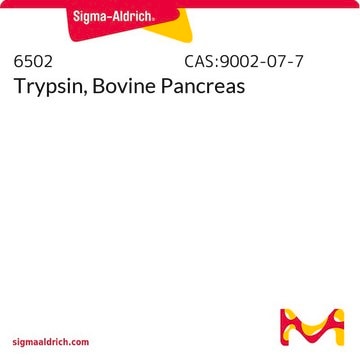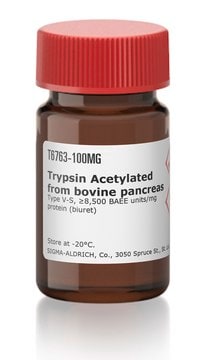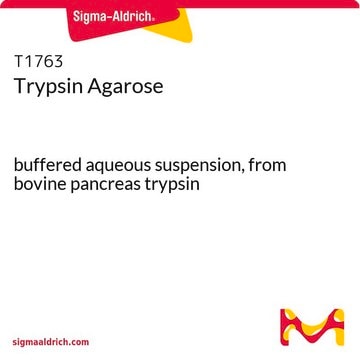T1005
Trypsin from bovine pancreas
Type XI, lyophilized powder, ≥6,000 BAEE units/mg protein
Synonym(s):
Serine Protease 1
About This Item
Recommended Products
biological source
bovine pancreas
type
Type XI
form
lyophilized powder
specific activity
≥6,000 BAEE units/mg protein
mol wt
23.8 kDa
composition
protein, 90-100%
impurities
salt, essentially free
solubility
hydrochloric acid: soluble 1 mM, clear
foreign activity
Chymotrypsin ≤0.1 BTEE units/mg protein
storage temp.
−20°C
Looking for similar products? Visit Product Comparison Guide
Application
- For Trypsinization, for eliminating the membrane bound alloantigen.
- For incubating 20-kD amylase-binding component, to evaluate its Chemical nature.
- To prepare lactoferrin degradation products for evaluating its antiadipogenic activity.
Biochem/physiol Actions
Serine protease inhibitors, including DFP, TLCK, APMSF, AEBSEF, and aprotinin, amongst others, will inhibit Trypsin.
Components
Caution
Unit Definition
Preparation Note
inhibitor
substrate
Signal Word
Danger
Hazard Statements
Precautionary Statements
Hazard Classifications
Eye Irrit. 2 - Resp. Sens. 1 - Skin Irrit. 2 - STOT SE 3
Target Organs
Respiratory system
Storage Class Code
11 - Combustible Solids
WGK
WGK 1
Personal Protective Equipment
Certificates of Analysis (COA)
Search for Certificates of Analysis (COA) by entering the products Lot/Batch Number. Lot and Batch Numbers can be found on a product’s label following the words ‘Lot’ or ‘Batch’.
Already Own This Product?
Find documentation for the products that you have recently purchased in the Document Library.
Customers Also Viewed
Protocols
Continuous spectrophotometric rate determination method using BAEE substrate measures trypsin activity, essential for enzyme characterization.
Continuous spectrophotometric rate determination method using BAEE substrate measures trypsin activity, essential for enzyme characterization.
Continuous spectrophotometric rate determination method using BAEE substrate measures trypsin activity, essential for enzyme characterization.
Continuous spectrophotometric rate determination method using BAEE substrate measures trypsin activity, essential for enzyme characterization.
Our team of scientists has experience in all areas of research including Life Science, Material Science, Chemical Synthesis, Chromatography, Analytical and many others.
Contact Technical Service










